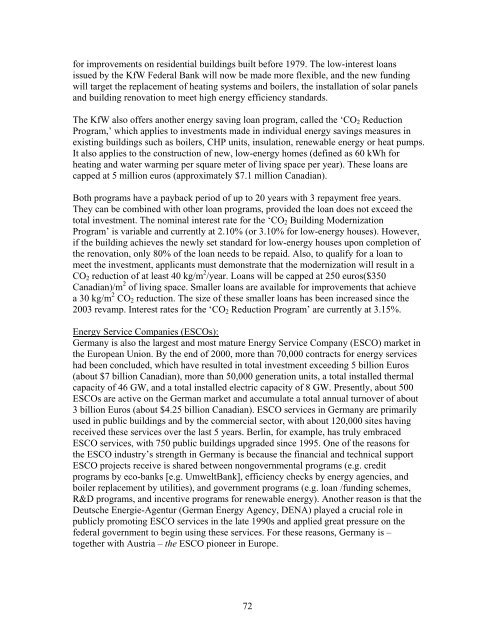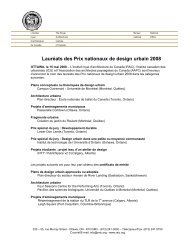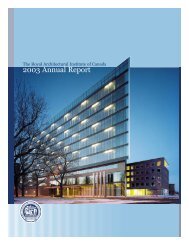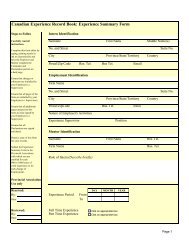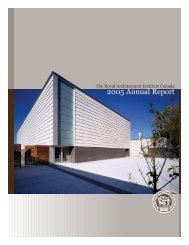Benchmark Study on Green Buildings - Royal Architectural Institute ...
Benchmark Study on Green Buildings - Royal Architectural Institute ...
Benchmark Study on Green Buildings - Royal Architectural Institute ...
Create successful ePaper yourself
Turn your PDF publications into a flip-book with our unique Google optimized e-Paper software.
for improvements <strong>on</strong> residential buildings built before 1979. The low-interest loans<br />
issued by the KfW Federal Bank will now be made more flexible, and the new funding<br />
will target the replacement of heating systems and boilers, the installati<strong>on</strong> of solar panels<br />
and building renovati<strong>on</strong> to meet high energy efficiency standards.<br />
The KfW also offers another energy saving loan program, called the ‘CO 2 Reducti<strong>on</strong><br />
Program,’ which applies to investments made in individual energy savings measures in<br />
existing buildings such as boilers, CHP units, insulati<strong>on</strong>, renewable energy or heat pumps.<br />
It also applies to the c<strong>on</strong>structi<strong>on</strong> of new, low-energy homes (defined as 60 kWh for<br />
heating and water warming per square meter of living space per year). These loans are<br />
capped at 5 milli<strong>on</strong> euros (approximately $7.1 milli<strong>on</strong> Canadian).<br />
Both programs have a payback period of up to 20 years with 3 repayment free years.<br />
They can be combined with other loan programs, provided the loan does not exceed the<br />
total investment. The nominal interest rate for the ‘CO 2 Building Modernizati<strong>on</strong><br />
Program’ is variable and currently at 2.10% (or 3.10% for low-energy houses). However,<br />
if the building achieves the newly set standard for low-energy houses up<strong>on</strong> completi<strong>on</strong> of<br />
the renovati<strong>on</strong>, <strong>on</strong>ly 80% of the loan needs to be repaid. Also, to qualify for a loan to<br />
meet the investment, applicants must dem<strong>on</strong>strate that the modernizati<strong>on</strong> will result in a<br />
CO 2 reducti<strong>on</strong> of at least 40 kg/m 2 /year. Loans will be capped at 250 euros($350<br />
Canadian)/m 2 of living space. Smaller loans are available for improvements that achieve<br />
a 30 kg/m 2 CO 2 reducti<strong>on</strong>. The size of these smaller loans has been increased since the<br />
2003 revamp. Interest rates for the ‘CO 2 Reducti<strong>on</strong> Program’ are currently at 3.15%.<br />
Energy Service Companies (ESCOs):<br />
Germany is also the largest and most mature Energy Service Company (ESCO) market in<br />
the European Uni<strong>on</strong>. By the end of 2000, more than 70,000 c<strong>on</strong>tracts for energy services<br />
had been c<strong>on</strong>cluded, which have resulted in total investment exceeding 5 billi<strong>on</strong> Euros<br />
(about $7 billi<strong>on</strong> Canadian), more than 50,000 generati<strong>on</strong> units, a total installed thermal<br />
capacity of 46 GW, and a total installed electric capacity of 8 GW. Presently, about 500<br />
ESCOs are active <strong>on</strong> the German market and accumulate a total annual turnover of about<br />
3 billi<strong>on</strong> Euros (about $4.25 billi<strong>on</strong> Canadian). ESCO services in Germany are primarily<br />
used in public buildings and by the commercial sector, with about 120,000 sites having<br />
received these services over the last 5 years. Berlin, for example, has truly embraced<br />
ESCO services, with 750 public buildings upgraded since 1995. One of the reas<strong>on</strong>s for<br />
the ESCO industry’s strength in Germany is because the financial and technical support<br />
ESCO projects receive is shared between n<strong>on</strong>governmental programs (e.g. credit<br />
programs by eco-banks [e.g. UmweltBank], efficiency checks by energy agencies, and<br />
boiler replacement by utilities), and government programs (e.g. loan /funding schemes,<br />
R&D programs, and incentive programs for renewable energy). Another reas<strong>on</strong> is that the<br />
Deutsche Energie-Agentur (German Energy Agency, DENA) played a crucial role in<br />
publicly promoting ESCO services in the late 1990s and applied great pressure <strong>on</strong> the<br />
federal government to begin using these services. For these reas<strong>on</strong>s, Germany is –<br />
together with Austria – the ESCO pi<strong>on</strong>eer in Europe.<br />
72


